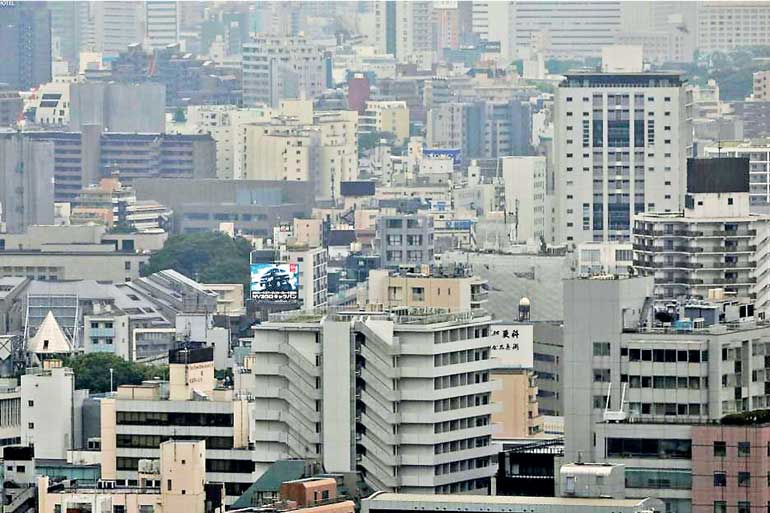Thursday Feb 19, 2026
Thursday Feb 19, 2026
Friday, 16 February 2018 00:00 - - {{hitsCtrl.values.hits}}
 TOKYO (Reuters) - Japan’s economy posted its longest continuous expansion since the 1980s boom as fourth quarter growth was boosted by consumer spending, and moved Prime Minister Shinzo Abe’s revival plan another step closer to vanquishing decades of stagnation.
TOKYO (Reuters) - Japan’s economy posted its longest continuous expansion since the 1980s boom as fourth quarter growth was boosted by consumer spending, and moved Prime Minister Shinzo Abe’s revival plan another step closer to vanquishing decades of stagnation.
The long run of growth is also an encouraging sign for the Bank of Japan, hinting that the economy may at last be building up momentum to lift consumer prices toward its 2% inflation target.
Nonetheless, the lack of any inflation effect in the data and a decline in real wages for the quarter highlight the challenges still facing the BOJ’s efforts to foster a virtuous cycle of growth, consumer spending and business investment - a key element of the “Abenomics” policy.
The GDP data comes after news that Abe’s government has decided to nominate Haruhiko Kuroda for a rare second term as Bank of Japan governor, a sign his ultra-loose monetary policy will remain in place, although investors still have questions about who the deputy governors will be and what policies they are likely to favor.
Japan’s economy has now posted the longest continuous expansion since a 12-quarter stretch of growth between April-June 1986 and January-March 1989 around the height of Japan’s notorious economic bubble.
The economy expanded at a 0.5% annualized rate in October-December, less than the median estimate for annualized growth of 0.9%, Cabinet Office data showed on Wednesday. That followed a revised 2.2% annualized increase in July-September.
“The headline figures are somewhat weaker than expected, but that’s not something to worry too much about,” said Yoshiki Shinke, chief economist at Dai-ichi Life Research Institute.
“Capital expenditure and consumption are picking up. Exports are also strong. Other recent data are also strong. It’s safe to say the economy is in pretty good shape.”
Compared to the previous quarter, gross domestic product (GDP) grew 0.1%, slightly less than the median estimate of 0.2% growth and following a 0.6% quarter-on-quarter expansion in July-September, Cabinet Office data showed on Wednesday.
Despite the weaker-than-expected headline figures, many economists say they expect growth to continue because companies can use their strong profits for capital expenditure.
The tightest labor market in about 40 years is also expected to finally give unions more bargaining power in wage negotiations.
Private consumption, which accounts for about two-thirds of GDP, rose 0.5% from the previous quarter, more than the median estimate of a 0.4% increase and a rebound from a revised 0.6% decline in the previous quarter.
Increased spending on mobile phones, cars, and dining out drove gains in private consumption, a Cabinet Office official said.
“Employment and income conditions continue to improve and consumer sentiment is picking up, private consumption is expected to continue a pick-up trend,” Japanese Economy Minister Toshimitsu Motegi told reporters.
To be sure, some economists are more cautious about domestic demand because any further declines in global stocks could hurt sentiment and returns on investors’ portfolios.
Real wages fell 0.4% in the fourth quarter, the first decline in three quarters, which is another risk to domestic demand.
“I‘m a little worried about sluggish wage growth,” said Daiju Aoki, regional chief investment officer at UBS Securities.
“I‘m also worried about a negative wealth effect from a falling stock market.”
Capital expenditure rose 0.7% in October-December from the previous quarter, less than the median estimate for a 1.1% increase but up for the fifth straight quarter and a sign of sustainable gains in business investment.
Overseas demand subtracted fractionally from GDP in October-December. Exports rose 2.4%, but this gain was offset by a 2.9% jump in imports thanks to robust domestic demand.
Since taking office in late 2012, Abe has enacted reforms to draw more women and elderly people into the workforce, raise wages for part-time workers, liberalize the labor market, and encourage business investment.
“Domestic demand is strong enough that it can stand on its own two feet, so you can say Abenomics has matured,” said Hiroshi Miyazaki, senior economist at Mitsubishi UFJ Morgan Stanley Securities.
“Financial market moves pose risks, but I still expect consumption and business investment to drive future growth.”